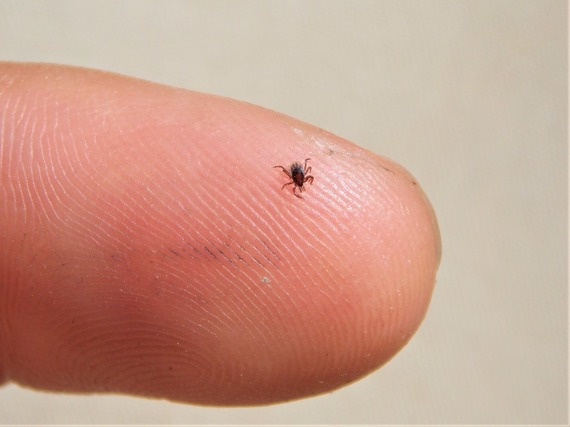|
As summer sun brings you outdoors, you may run into unwanted company in the form of ticks. Ticks can transmit diseases, such as Lyme disease, alpha-gal syndrome, and tularemia, that are harmful to humans and pets. Don’t let ticks “bug” you. When hiking outdoors, follow these simple steps to help stay safe from ticks:
- Wear light-colored clothing that covers your arms and legs.
- Use a repellant that contains DEET or another EPA-approved product.
- Walk near the center of trails and avoid walking through high grass and brush.
- After enjoying the outdoors, carefully check yourself, small children, and your pets for ticks.
The best way to prevent tick-borne illnesses is to prevent the bites of infected ticks. You can do this by avoiding tick habitats, using personal protection methods, and changing the environment to reduce the presence of ticks.
CDC Tick Prevention Resources.
- Before you go outside
- Know where to expect ticks. Spending time in grassy, brushy, or wooded areas could expose you to ticks. This could include walking your dog, gardening, playing outside, hiking, camping, hunting, or other outdoor activities. Many people get tick bites in their own backyards or neighborhoods.
- Treat your clothes and outdoor gear with 0.5% permethrin. Permethrin can be used to treat boots, clothing, and camping gear and remains protective through several washings. Permethrin should never be applied directly to the skin.
- Wear EPA-registered insect repellents. The Environmental Protection Agency (EPA) recommends repellents containing DEET, picaridin, IR3535, oil of lemon eucalyptus, para-menthane-diol, or 2-undecanone. Not all repellents are effective against both mosquitoes and ticks. EPA’s helpful search tool can help you find the product that is best for you. Always follow product instructions.
- Do not use insect repellent on babies younger than 2 months old.
- Do not use products containing oil of lemon eucalyptus or para-menthane-diol on children younger than 3 years old.
- Reduce the amount of exposed skin. Wearing long sleeves, long pants, hats, socks, and shoes that cover the entire foot will reduce the chance that a tick will be able to attach. Tucking in your shirt and stuffing your pant legs inside the tops of your socks is also recommended. Wearing light-colored clothing may make ticks easier to see and remove.

Photo: Centers for Disease Control and Prevention.
- While you are outside
- Reapply insect repellent according to the product instructions.
- Avoid grassy, brushy, or wooded areas when possible.
- Walk in the center of marked trails in order to avoid brushing against tall grass and plants.
- Check clothing and skin frequently for ticks.

Tick habitat. Photo: Lee Green, Indiana State Department of Health.
- After you come inside
- Dry your clothing to kill ticks. Unattached ticks may be carried into the house on clothing. Immediately disrobing and tumbling dry clothes in a dryer on high heat for 20 minutes is recommended to kill ticks. If the clothes are damp, additional time may be needed. When washing, hot water is recommended because cold or warm water will not kill ticks.
- Shower soon after being outdoors. Showering within two hours of coming indoors has been shown to reduce your risk of getting Lyme disease and may be effective in reducing the risk of other tickborne diseases. Showering may help wash off unattached ticks and it is a good opportunity to do a tick check.
- Check your body for ticks soon after being outdoors. Conduct a full body check upon return from potentially tick-infested areas, including your own backyard. Immature ticks are much smaller than adults and can be no larger than a poppy seed. Use a hand-held or full-length mirror to view all parts of your body. Check these parts of your body and your child’s body for ticks:
- In and around the hair
- In and around the ears
- Under the arms
- Around the waist
- Inside belly button
- Between the legs
- Back of the knees
- Examine gear and pets for ticks. Ticks can ride into the home on clothing and pets, then attach to a person later, so carefully examine pets, coats, and daypacks.

Graphic: Centers for Disease Control and Prevention.
- How to remove an attached tick
DO NOT use remedies such as “painting” the tick with nail polish or petroleum jelly or using heat to make the tick detach from the skin. Your goal is to remove the tick as quickly as possible–not wait for it to detach. Here’s how to safely and quickly remove a tick:
- Use fine-tipped tweezers or a tick removal tool to grasp the tick as close to the skin’s surface as possible.
- Pull upward with steady, even pressure. Don’t twist or jerk the tick; this can cause the mouth-parts to break off and remain in the skin. If this happens, remove the mouth-parts with tweezers. If you are unable to remove mouth parts easily with clean tweezers, leave the area alone and let the skin heal.
- After removing the tick, thoroughly clean the bite area and your hands with rubbing alcohol or soap and water.
- Never crush a tick with your fingers. Dispose of a live tick by putting it in alcohol, placing it in a sealed bag/container, wrapping it tightly in tape, or flushing it down the toilet.

Graphic: Centers for Disease Control and Prevention.
- What to do if you feel sick
Not everyone who develops a tick-borne illness remembers having a tick bite. If you develop a rash or fever within several weeks of outdoor activity, see your health care provider. Be sure to tell him or her about the nature of your outdoor exposures at home and during travel.
- How to reduce ticks in your yard
While it is not possible to eliminate ticks from grassy, brushy, or woody areas, there are steps you can take to reduce the number of ticks in your yard, including:
- Promptly remove dead leaves.
- Clear tall grasses and brush around homes and at the edge of lawns.
- Place a three-foot wide barrier of wood chips or gravel between lawns and wooded areas to restrict tick migration into recreational areas.
- Mow the lawn frequently.
- Stack wood neatly and in a dry area to discourage rodents.
- Keep playground equipment, decks, and patios away from yard edges and trees.
- Construct fences to discourage unwelcome animals (such as deer, raccoons, and stray dogs) from entering your yard.
- Remove old furniture, mattresses, or trash from the yard that may give ticks a place to hide.
In severe cases, a single application of insecticide can be effective in reducing ticks on the lawn or in other outdoor areas. Consult with a licensed pesticide applicator before taking this step.
- How to prevent ticks on pets
Dogs are susceptible to tick bites and tick-borne diseases. Dogs and cats can also bring unattached ticks into your home, placing you at risk for tick bites even if you have not spent any time outdoors. For these reasons, it’s important to use a tick prevention product on your pets.
Talk to your veterinarian about:
- How tick-borne illnesses could affect your pets’ health
- The best tick prevention products for your pets
To further reduce the chances that a tick bite will make your pet sick:
- Check your pets for ticks daily, especially after they spend time outdoors.
- If you find a tick on your pet, remove it right away.
- Reduce tick habitats in your yard.
Note: Cats are extremely sensitive to a variety of chemicals. Do not apply tick prevention products to your cats without first consulting with your veterinarian.

Graphic: Centers for Disease Control and Prevention.
|


















































